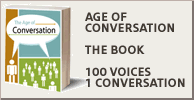Jerry was presenting his "Brain" (a piece of software that's tagged over 60,000 pieces of information). The Brain goes beyond other tagging tools like del.icio.us because it shows the inter-relationship between the tags.
The Brain could be exactly what we all need to keep track of the disparate pieces of information that we seem to be collecting at an accelerating rate.
Chris highlights the most interesting part of Jerry's discussion that raised the notion that the greatest thinkers who talked about connection, sharing, collaboration or creativity; were all essentially rallying against one thought- "We Don't Trust You."
It brought up the interesting notion of who is the "We" in this statement.
The group concluded that the "We" was a myriad of things, ranging from authority figures and government to "ourselves".
Chris has taken this thought on and applied it to business is identifying living examples of how business doesn't trust its customers.
He is really onto something interesting here as he isolates a fundamental problem that business has today; the distance between it and it's consumers.
It's all about control and the feeling that companies want to feel in control of the process. Giving up control is often really hard, but it's now a reality that companies need to face up to. The idea that broadcast networks didn't trust you to watch television on your own time, the movie studios didn't trust you to go somewhere other than the cinema to watch a new movie release and the record companies didn't trust you to buy only certain tracks on albums.
Companies also didn't trust us to:
Design our own products
Make our own advertising
Create our own communities
Comment on product performance
Understand what really goes into certain products-how and where they are made
These are all examples of the change that's now being forced upon companies by changing technology.
However there's still a state of mind inside many organizations; that stops them from really seeing the consumer for who they really are and giving up some of the control and handing it over to their customers.
It's something that came up in our research on Scion. The brand was praised because it allowed its customers to theoretically void their warranties with modifications; most of our respondents felt that other car companies were not like Scion because they were not as trusting of their customers.
There's obviously an interesting framework here for brands and those who think about brands to work on. Think about the barriers that you currently have that indicate you don't trust your customers and try and imagine ways that you might close those gaps.
What can you add to this phrase
"We trust you to......."?
It appears you don't have Flash installed.
